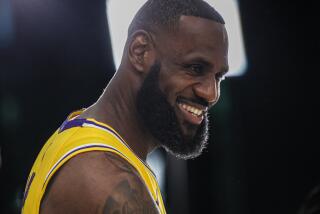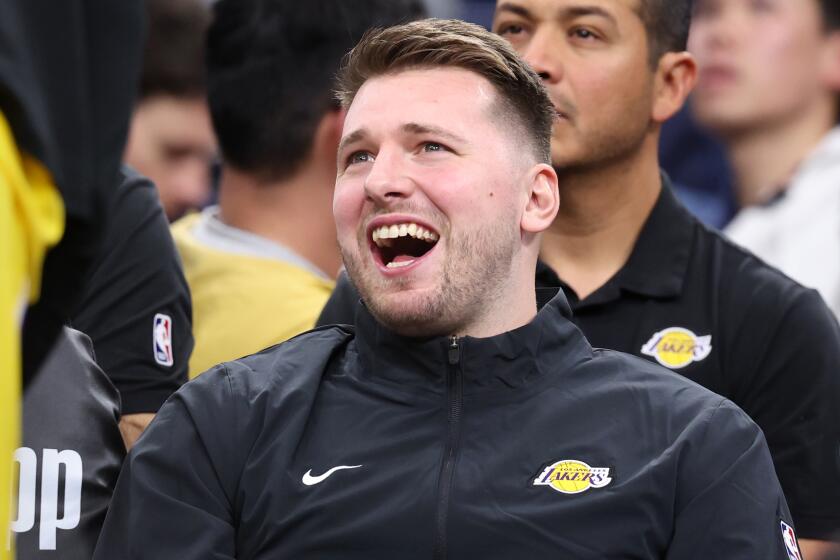Shaq’s Burden Is Lighter
- Share via
Three months ago, what Laker fans talked about was Shaquille O’Neal, his weight, his knee, his attitude, and his role in the Lakers’ four-peat-turned-collapse.
The basketball news in Los Angeles changed quickly and sensationally, however, and O’Neal, rather than banging out sit-ups and having a whole town count along with him, went underground and did them alone.
On Tuesday evening, looking hard and lean in a casual gray suit, O’Neal sat in a sound stage in Hollywood, filming a cameo for “The Ortegas,” a Fox show due out in the fall, said he’d lost about 15 pounds and then shrugged.
“If I don’t get the ball, though, it won’t make any difference at all,” he said. “A lot of people talk about me as if I had a weight problem. The only problem I had was waiting for the ball. So, run it through the Diesel. I’m mad and I’m ready to go.”
He laughed. When last seen, O’Neal’s weight was close to 360 pounds, his body fat was at least 20%. His knee was sore, and his mood sour, but that was in June, and a few things have changed since.
For one, the Lakers aren’t all that, well, thin anymore. Karl Malone and Gary Payton have been given their jerseys, what Kobe Bryant used to call “the golden armor,” at about the time most players are getting “the golden handshake,” and yet the lineup looks younger and fresher.
Mitch Kupchak, the man O’Neal challenged to bring in talent, has a new contract extension, Phil Jackson’s is coming soon, and O’Neal is eligible to re-up in October, though there are indications the club might not be so eager to hand over the maximum allowed -- three years and $121 million.
“It’d be nice if they gave it to me,” he said. “I think I deserve it.”
Those negotiations have not yet started, according to O’Neal. As the off-season drifts into its final month, summer finds Jackson in Montana, Malone having found a home in the same Newport Beach neighborhood as Bryant, and Payton still looking.
It has, of course, been a conflicting time for the Lakers, who exulted in the rebuilding of their roster and lamented the felony charges brought against Bryant, their best and most marketable player, and what that situation might do to their season.
O’Neal would not comment on Bryant’s predicament, on whether he should play or not. He said he called Bryant once early in the summer, left him a message, never heard back, and left him with that space.
“A lot of guys are talking who shouldn’t be saying anything,” he said.
But, he did say the distractions would not disrupt a veteran team that grew wiser and more mature in the off-season.
“I’m not afraid of that,” he said. “We’re going to have a lot of trials and tribulations this season. But, we’ve got some old, cunning veterans. Karl Malone is cunning and Gary Payton is cunning.”
The Western Conference is arguably better than it was last season, when six teams won at least 50 games. O’Neal averaged 27.5 points and 11.1 rebounds, the Lakers were gone in the second round, and then Jackson told O’Neal he thought a single MVP award -- won three years ago -- over his entire career would be a shame.
O’Neal said that would be fine, that he would require a bit more quality time with the basketball, and Jackson apparently did not disagree. In their lively news conference, held about six weeks later, Malone and Payton said they would gladly defer to O’Neal.
And, although Bryant has taken an increasingly larger role in the offense, his situation might dictate a slight retreat. Beyond Bryant’s next court appointment -- Oct. 9 -- no one can predict what his schedule would bring, including when a trial might begin, and what that might do to his on-court consistency or his emotions.
In fact, although the organization expects Bryant to be in camp and to play the season, and while Bryant has told those near him that he expects the same, there is no guarantee of either, which, again, would mean a greater burden for O’Neal.
In July, O’Neal hired a personal trainer, a former Marine from Portland, Ore., whose task it was to aid the Laker center in the areas of conditioning, strength and body composition.
His business manager, Mike Parris, at the time called it a “lifestyle decision.” So, according to O’Neal and those around him, trainer Corey Gilday moved to Orlando, and the two set about changing some of O’Neal’s habits. Not all of them, but enough, perhaps, to ease some of the stress on his feet and knees, and enough, perhaps, to allow him to get up and down the floor with Payton, Malone and Bryant.
“I just had time this summer,” he said. “The last three years, I didn’t have time. I lifted weights every day. And I ran. That’s all. I’m a lot stronger because I’ve been able to get rest. Last year, I never told you all, but I was messed up. My knee, from running wrong.”
The trainer, O’Neal said, “was cool, but it was something I would have done anyway.”
There were benefits. Asked if he went anywhere this summer, O’Neal smiled and said, “No. Stayed at the crib. Had to.”
Leaving only a couple of things left to do over the next month.
“Work harder,” he said. “Get more chiseled.”
More to Read
All things Lakers, all the time.
Get all the Lakers news you need in Dan Woike's weekly newsletter.
You may occasionally receive promotional content from the Los Angeles Times.









